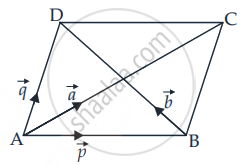Advertisements
Advertisements
प्रश्न
Show that area of the parallelogram whose diagonals are given by `vec"a"` and `vec"b"` is `(|vec"a" xx vec"b"|)/2`. Also find the area of the parallelogram whose diagonals are `2hat"i" - hat"j" + hat"k"` and `hat"i" + 3hat"j" - hat"k"`.
उत्तर

Let ABCD be a parallelogram such that,
`vec"AB" = vec"p"`
`vec"AD" = vec"q" = vec"BC"`
∴ By law of triangle, we get
`vec"AC" = vec"a" = vec"p" + vec"q"` .....(i)
And `vec"BD" = vec"b" = -vec"p" + vec"q"` .....(ii)
Adding equation (i) and (ii) we get,
`vec"a" + vec"b" = 2vec"q"`
⇒ `vec"q" = ((vec"a" + vec"b")/2)`
Subtracting equation (ii) from equation (i) we get
`vec"a" - vec"b" = 2vec"p"`
⇒ `vec"p" = ((vec"a" - vec"b")/2)`
∴ `vec"p" xx vec"q" = 1/4(vec"a" + vec"b") xx (vec"a" - vec"b")`
= `1/4 (vec"a" xx vec"a" - vec"a" xx vec"b" + vec"b" xx vec"a" - vec"b" xx vec"b")`
= `1/4(-vec"a" xx vec"b" xx vec"b" xx vec"a")` ......`[(because vec"a" xx vec"a" = 0),(vec"b" xx vec"b" = 0)]`
= `1/4(vec"a" xx vec"b" + vec"a" xx vec"b")`
= `1/4 * 2(vec"a" xx vec"b")`
= `|vec"a" xx vec"b"|/2`
So, the area of the parallelogram ABCD = `|vec"p" xx vec"q"| = 1/2|vec"a" xx vec"b"|`
Now area of parallelogram whose diagonals are `2hat"i" - hat"j" + hat"k"` and `hat"i" + 3hat"j" - hat"k"`
= `1/2|(2hat"i" - hat"j" + hat"k") xx (hat"i" + 3hat"j" - hat"k")|`
= `-|(hat"i", hat"j", hat"k"),(2, 1, 1),(1, 3, 1)|`
= `1/2 |hat"i"(1 - 3) - hat"j"(-2 - 1) + hat"k"(6 + 1)|`
= `1/2 - 2hat"i" + 3hat"j" + 7hat"k"|`
= `1/2 sqrt((-2)^2 + (3)^2 + (7)^2)`
= `1/2 sqrt(4 + 9 + 49)`
= `1/2 sqrt(62)` sq.units
Hence, the required area is `1/2 sqrt(62)` sq.units
APPEARS IN
संबंधित प्रश्न
If a unit vector `veca` makes angles `pi/3` with `hati,pi/4` with `hatj` and acute angles θ with ` hatk,` then find the value of θ.
Write the value of `vec a .(vecb xxveca)`
If `veca=hati+2hatj-hatk, vecb=2hati+hatj+hatk and vecc=5hati-4hatj+3hatk` then find the value of `(veca+vecb).vec c`
If `veca=2hati+hatj+3hatk and vecb=3hati+5hatj-2hatk` ,then find ` |veca xx vecb|`
Find x such that the four points A(4, 1, 2), B(5, x, 6) , C(5, 1, -1) and D(7, 4, 0) are coplanar.
A line passing through the point A with position vector `veca=4hati+2hatj+2hatk` is parallel to the vector `vecb=2hati+3hatj+6hatk` . Find the length of the perpendicular drawn on this line from a point P with vector `vecr_1=hati+2hatj+3hatk`
If `vecr=xhati+yhatj+zhatk` ,find `(vecrxxhati).(vecrxxhatj)+xy`
Find the angle between the vectors `2hat"i" - hat"j" + hat"k"` and `3hat"i" + 4hat"j" - hat"k"`.
If `vec"a" + vec"b" + vec"c"` = 0, show that `vec"a" xx vec"b" = vec"b" xx vec"c" = vec"c" xx vec"a"`. Interpret the result geometrically?
Using vectors, find the area of the triangle ABC with vertices A(1, 2, 3), B(2, – 1, 4) and C(4, 5, – 1).
Using vectors, prove that the parallelogram on the same base and between the same parallels are equal in area.
If `vec"a" = hat"i" + hat"j" + hat"k"` and `vec"b" = hat"j" - hat"k"`, find a vector `vec"c"` such that `vec"a" xx vec"c" = vec"b"` and `vec"a"*vec"c"` = 3.
The value of λ for which the vectors `3hat"i" - 6hat"j" + hat"k"` and `2hat"i" - 4hat"j" + lambdahat"k"` are parallel is ______.
The vectors from origin to the points A and B are `vec"a" = 2hat"i" - 3hat"j" + 2hat"k"` and `vec"b" = 2hat"i" + 3hat"j" + hat"k"`, respectively, then the area of triangle OAB is ______.
For any vector `vec"a"`, the value of `(vec"a" xx hat"i")^2 + (vec"a" xx hat"j")^2 + (vec"a" xx hat"k")^2` is equal to ______.
If `|vec"a"|` = 10, `|vec"b"|` = 2 and `vec"a".vec"b"` = 12, then value of `|vec"a" xx vec"b"|` is ______.
The vectors `lambdahat"i" + hat"j" + 2hat"k", hat"i" + lambdahat"j" - hat"k"` and `2hat"i" - hat"j" + lambdahat"k"` are coplanar if ______.
If `|vec"a"|` = 4 and −3 ≤ λ ≤ 2, then the range of `|lambdavec"a"|` is ______.
The value of the expression `|vec"a" xx vec"b"|^2 + (vec"a".vec"b")^2` is ______.
